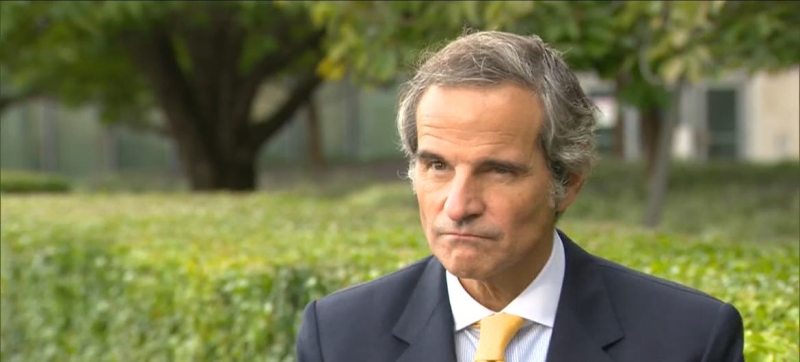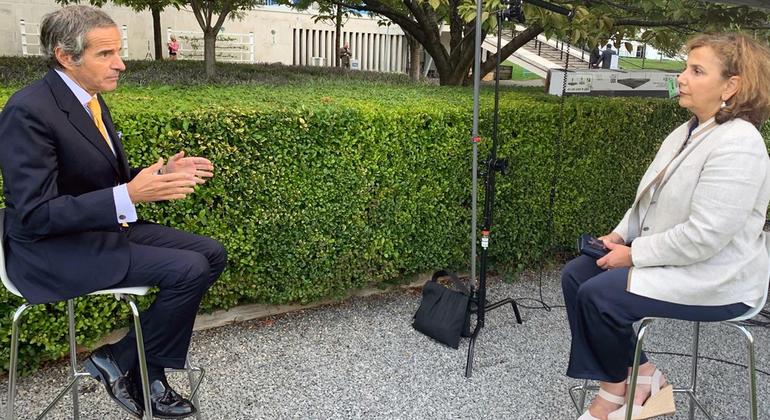
IAEA Director General during an interview with the UN News Service. INTERVIEW | IAEA Chief: “We have 70 years of experience in the safe commercial use of nuclear energy” Peace and Security
The Director General of the International Atomic Energy Agency (IAEA) is taking part in the UN General Assembly High-Level Week currently underway in New York, among other high-ranking guests. In an interview with Nargis Shekinskaya from the UN News Service, Rafael Mariano Grossi spoke about attempts to establish a dialogue with the new Iranian authorities, the situation at nuclear power plants in Ukraine and Russia, and the prospects for the development of nuclear energy.
UN News: The Iranian government recently announced that it is ready to resume negotiations on the nuclear deal. How optimistic are you about this??
Rafael Mariano Grossi: I think we need to continue this important work. The international community has a certain level of concern about the nuclear programme of the Islamic Republic of Iran. After the transition period and the new government coming to power last month, I think it is important that we continue the dialogue. We have already met with the new Iranian Foreign Minister, who is very familiar with this topic, as he was a nuclear negotiator in the past. I have been working with him for a long time. We will meet with him soon in Tehran to do two things. The first is to get clarification on a number of questions that have not yet been fully answered. The second is to return to the negotiating process in order to have an agreed framework for moving forward. We need to return to nuclear diplomacy. Our agency proposes a number of specific measures related to verification and monitoring of certain activities that could be adopted already at this stage. These negotiations have a political aspect, but without adequate verification and monitoring, which the IAEA does, any agreement will have relative value. When it comes to nuclear production, someone has to check what is really going on. I think we should not add another crisis to the already unstable situation in the Middle East, as would be the case if the Islamic Republic of Iran were to have a proliferation incident. We must not allow that to happen, and we have the tools to prevent that.

UN News Service: Let’s turn to Ukraine. You regularly visit Ukrainian nuclear power plants. Now Russia [Kursk NPP] has joined in. How do you assess the risk of a nuclear disaster in the context of war in Ukraine?
RMG: There is a combat zone, there is an ongoing war. The surprises began on February 22 and continue on the contact line. There were a number of events related to either shelling or drone attacks, with the cessation of external power supply. We managed to organize a permanent presence of IAEA experts who monitor the situation, interact with the management of the stations and try to prevent a possible accident. And now, unexpectedly, the situation in Kursk has been added to this, where I also recently visited. The problem is the militarization of nuclear facilities. We see the possibility of nuclear accidents, which has not happened before. And there are also statements about the possible use of nuclear weapons. Some countries are normalizing talk about the possibility of their proliferation. The sacred mandate of the IAEA is that we, as the guarantor of the Treaty on the Non-Proliferation of Nuclear Weapons, do not allow this. Imagine a world with all this tension, where there are 15-20 countries with nuclear weapons. In this situation, the use of nuclear weapons will most likely happen. So I think we have to strengthen our commitments and strengthen the institutions that protect those commitments. The UN Secretary-General has been very supportive of me and the agency, and we are very grateful for that.
UN News Service: Nuclear power plants are a reliable source of clean energy, but people are concerned about safety. One example is the situation in Kazakhstan, where the government wants to move forward with plans to build a nuclear power plant. What would you say to people who have such concerns?
RMG: Nuclear energy has an excellent reputation overall, although of course there have been a couple of very high-profile, very dramatic accidents – Chernobyl, Fukushima. Accidents like that should not happen. There are 70 years of safe commercial use of nuclear energy. The statistics are very clear that nuclear energy is probably the safest energy technology. This is shown by comparing mortality and morbidity rates among those living near different types of plants. We consider nuclear safety a priority. Speaking specifically about Kazakhstan, there will be a referendum on the possibility of building nuclear power plants in the country. What is important to us is that countries follow internationally agreed safety standards.
UN News Service: High-Level Week continues here in New York. What is your key message to world leaders today?
RMG: My message is very simple. We must take full advantage of the peaceful uses of nuclear energy. And, of course, we must be vigilant in doing so. Trends such as attempts to use industrial nuclear facilities for military purposes are unacceptable. Fortunately, we have international organizations such as the UN and the IAEA that monitor such things to ensure that they do not happen. So my message is one of optimism.
